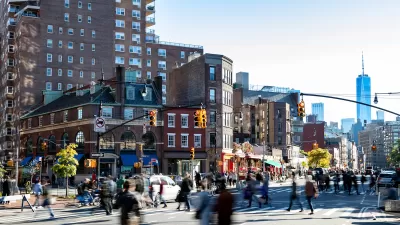(NOTE TO READERS: An expanded, footnote-filled version of this article is online at http://papers.ssrn.com/sol3/papers.cfm?abstract_id=1632935 ) Externalities are costs (or benefits) imposed on third parties by another individual’s voluntary action. Government regulations exist at least partially to protect us from externalities created by others.
(NOTE TO READERS: An expanded, footnote-filled version of this article is online at http://papers.ssrn.com/sol3/papers.cfm?abstract_id=1632935 )
Externalities
are costs
(or benefits) imposed on third parties by another individual's voluntary
action. Government regulations exist at least partially to protect us from externalities created by others.
But government regulation may create its own externalities, leading to costs that may even outweigh the benefits (or "positive externalities") created by regulation.
One
example of
externality-creating regulation is government-imposed minimum parking
requirements. For example, Jacksonville, Florida
requires apartment complexes to provide 1.75 parking spaces per
one-bedroom
apartment - despite the fact that 16% of Jacksonville's
renter households don't even own one
car. The purpose of such regulation is
to prevent externalities- for example, to prevent drivers from creating congestion and pollution while they cruise the streets searching for parking spaces.
But
in fact, this
sort of regulation creates a variety of negative externalities.
First, minimum parking requirements, by
artificially increasing the supply of parking, reduce the cost of
parking and
thus force landowners not only to build parking lots, but to give
parking to
motorists for free (or, in downtown areas, at lower rates than would be the case in the absence of regulation). But landowners still
have to pay to build parking lots and
garages; so landowners will pass the costs of parking lot construction on to their tenants and
customers in
the form of higher rents and prices. So as a practical matter, society as a whole is forced to subsidize driving; parking regulation makes driving cheaper by making parking free, and makes nondrivers pay more for goods and services to support this subsidy.
Second, minimum parking requirements reduce the total
amount of housing and commerce, because land that is used for parking
cannot be
used for housing or commerce. And by reducing the housing supply, minimum parking requirements reducce density- and residents of lower-density areas tend to be
highly
dependent on automobiles for most daily tasks, because they are less
likely to
live within walking distance of public transit and other amenities. So in this respect as well, minimum parking
requirements increase driving and its negative side effects.
Third,
minimum
parking requirements indirectly discourage walking, by encouraging
landowners
to surround their buildings with parking.
Where shops and offices are surrounded by a sea of parking, they
are
unpleasant places for pedestrians, because pedestrians must waste time
walking
through parking lots and risk their lives dodging automobiles. When walking is unpleasant, people drive more
and walk less.
Thus, minimum parking requirements make driving more attractive and walking less so. It logically follows that municipal parking
regulation may actually increase, rather than decreasing, congestion and pollution. And by increasing the number of parking lots,
minimum parking requirements may increase pollution from stormwater
runoff. Rainstorms cause stormwater to
fall on parking lots, collect metal, oil and other pollutants lying on
the
ground, and then to run off into nearby waters, thus making those waters
dirtier and more dangerous.
Of
course, it
could be argued that the costs of minimum parking requirements are
slight,
because in the absence of such requirements most landowners would build
almost
as much parking as they do now in order to get financing.
But this argument cuts both ways: if
landowners would build parking lots in the absence of regulation, then
the
abolition of regulation is unlikely to create negative externalities significant enough to justify regulation.

Pennsylvania Mall Conversion Bill Passes House
If passed, the bill would promote the adaptive reuse of defunct commercial buildings.

Planning for Accessibility: Proximity is More Important than Mobility
Accessibility-based planning minimizes the distance that people must travel to reach desired services and activities. Measured this way, increased density can provide more total benefits than increased speeds.

World's Largest Wildlife Overpass In the Works in Los Angeles County
Caltrans will soon close half of the 101 Freeway in order to continue construction of the Wallis Annenberg Wildlife Crossing near Agoura Hills in Los Angeles County.

Eviction Looms for Low-Income Tenants as Rent Debt Rises
Nonprofit housing operators across the country face almost $10 billion in rent debt.

Brightline West Breaks Ground
The high-speed rail line will link Las Vegas and the Los Angeles area.

Colorado Bans No-Fault Evictions
In most cases, landlords must provide a just cause for evicting tenants.
City of Costa Mesa
Licking County
Barrett Planning Group LLC
HUD's Office of Policy Development and Research
Mpact Transit + Community
HUD's Office of Policy Development and Research
Tufts University, Department of Urban and Environmental Policy & Planning
City of Universal City TX
ULI Northwest Arkansas
Write for Planetizen
Urban Design for Planners 1: Software Tools
This six-course series explores essential urban design concepts using open source software and equips planners with the tools they need to participate fully in the urban design process.
Planning for Universal Design
Learn the tools for implementing Universal Design in planning regulations.


























